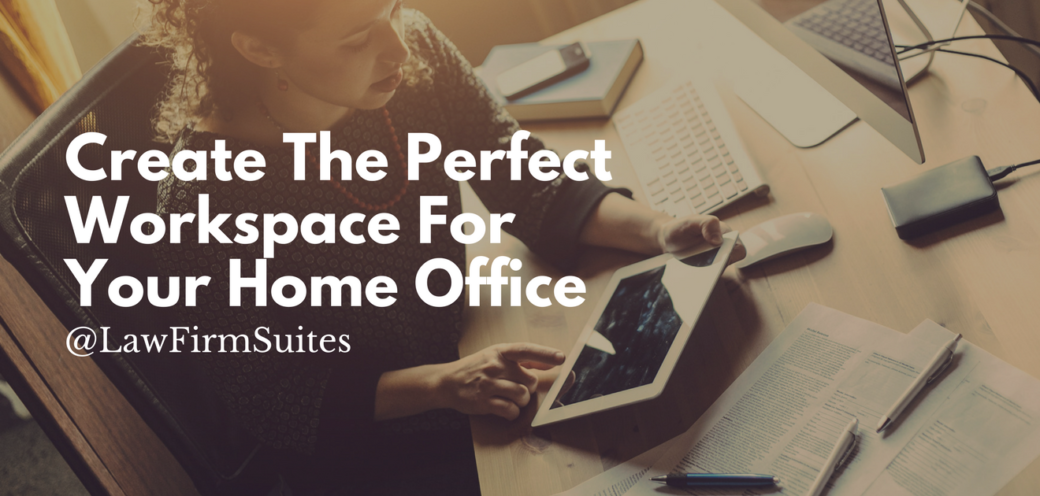Discover how a few simple additions and changes to your home office can dramatically improve your productivity and impression on clients.
Once you decide to take the plunge and launch your law practice from home, the first step is to set up your new home-based workspace. Begin by considering where and how you work best.
You are the boss. Design your home-office workspace around your own strengths and weaknesses. Disregard your mental vision of a “typical office” and begin creating an office that complements your strengths.
Find a dedicated workspace.
Find some place in your home where you can separate your work space from your personal space. Preferably, this should be in a separate room with a door that you can close, and it should be as far away as possible from the noises that your family or pets might make.
Ideally, the space should be large enough to accommodate your working files and have some extra room to accommodate your practice as it grows. However, in the case of urban dwellers where space is at a premium, your only option may be to convert a closet or utility room.
If you have options, choose the room based on what works best for your personality. If morning light motivates you, choose a room that is east-facing with a lot of windows. If a room with a view will be more of a distraction, choose a room without windows.
Invest in a room transformation to give yourself work “mindset”.
Professionals who work from home find that it can be difficult to get into the work “mindset”. There are endless distractions at home, and it takes a lot of discipline to buckle down. If you have the financial resources, invest in a room transformation, so you feel like a professional when you sit down to work.
You will be spending a lot of time in this room. Decorate it in a way that makes you happy. Paint the walls yellow if you like. Make the room as comfortable for yourself as you can.
A minor investment in your workspace will pay dividends in productivity in the years to come.
Your Office is a Self-Fulfilling Prophecy.
Decorate your office so it looks professional. If your office looks like an office, you will treat it like an office and keep it more organized. If you are short on cash, keep overhead low by only investing in furniture and technology as you absolutely need it. But be sure to plan ahead.
It will be extremely difficult to decide on a new laptop when you are trying to keep track of court filing dates. Instead make a wish-list. It will give you something to work hard towards on slow days.
Organize your office for success.
Being organized makes you more productive. Greater productivity means more hours billed. Don’t use working from home as an excuse for sloppy organization.
Set up a good system for organizing your practice. You will need to know where every file is kept so that you can access it on a moment’s notice. Clear all of the files off of your desk at the end of each day. If your performance suffers because of an unorganized home office, you will lose clients.
Don’t skimp on technology.
The cost for commercial grade office technology has come down so much, running your small practice from home has never been easier. To run a successful law practice however, you can’t rely solely on residential quality technology.
Consider investing in business grade Internet bandwidth at home to keep everything running smoothly when interacting with clients.
Legal practice is still very heavily phone based. For flexibility (and budgetary) reasons, it may be tempting to rely solely on a mobile phone for your practice’s needs. This is a mistake. Mobile phone quality can be unreliable and sound quality is poor. It will result in making a poor impression on prospective clients and adversaries, resulting in fewer clients won and weaker negotiation strength because the competition may not take you seriously.
Invest in a “law firm grade” telecommunications system. High quality telecom systems can be affordably obtained using VOIP technology, provided you have sufficient bandwidth to support the traffic. It may seem like an unnecessary expense at first. But, how will your most important client feel when your $20.00 a month phone drops calls every two minutes?
Consider a Virtual Office in an executive suite as second work location.
Your home office may be perfectly adequate to roll up your sleeves and do the “dirty work” of a legal practice (drafting, legal research, telephone negotiations), but meeting clients, employees or adversaries in your home may not be practical.
Or, you may find it helpful from time-to-time to get out of your office and work somewhere else.
Coffee shops can be one alternative, but they can be loud, and the use of public Wi-Fi may present confidentiality concerns. Libraries are quiet, but offer very little privacy and are not great places for meeting.
Consider some of these tips if you are about to or recently have opened you home-based law practice, and you will already be out and ahead of your competition!


